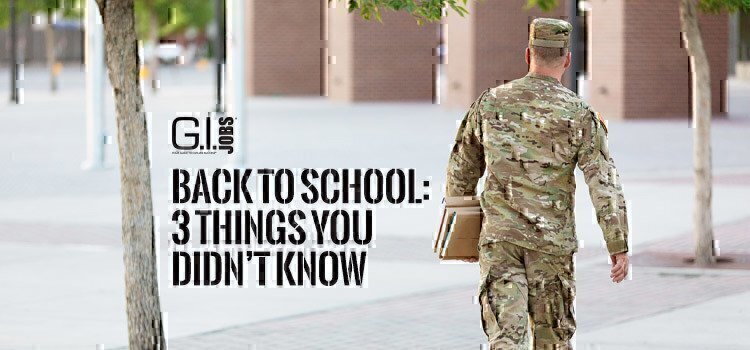Whether you enlisted right out of high school, completed a year or two of college first, or earned a degree and commissioned as an officer, now you’re at a point where you want to go back to school after separating from the military.
Congratulations! That’s a life-altering decision! But are you ready to implement it?
Countless vets have struggled with transitioning back into civilian life after spending years in the service. Usually this affects vets searching for employment. But what about ones going back to school? What challenges await?
Lots! Most of them, you can easily predict. But here are a few facts you may not have considered or perhaps were never told about!

1.) College Life is Expensive
In all likelihood you have some GI Bill benefits to tap into. This can assist you with the cost of tuition, so we won’t focus on tuition funding challenges for this article. But what about housing?
The GI Bill only offers Monthly Housing Allowance (MHA) if you are registered as at least a half-time student. And if you’re planning to take online courses only, MHA pays a maximum of $825.00, even if you’re a full-time student.
What about other costs of living? Food, utilities, phone, internet, fuel, insurance, clothing, social activities… what’s the plan to pay for all these things? Many college students work part-time, but bear in mind that college towns aren’t always located in places with ample job opportunities.
Many students end up working minimum wage jobs which don’t cover their costs. This results in either needing to take out student loans, borrowing money from family, or—perhaps worst of all—racking up high-interest credit card debt.
Working out a rock-solid funding plan in advance can help you ensure you’ve got all your bills and expenses covered without going deep in debt. Don’t forget to submit your Federal Student Aid application in advance of deadlines. And if you do need to accumulate debt due to grants or loans, write out your goals and timelines for paying them back without having to live on credit cards and ramen noodles.
2.) Overestimating Readiness
Let’s talk about what to expect workload-wise when you get boots-on-the-ground into a higher educational setting.
You probably got used to long work hours during your time in the service. Or maybe you managed to get all your work down during a routine shift, but those hours were jam-packed with duties. Long story short, you got used to being “busy.”
But being a full-time college student? That’s a whole other level of busy!
Many vets go in overconfident about their ability to juggle a full course load. Those students get in over their head, get behind on assignments or fail to study sufficiently to pass exams with the grades they want. This, in turn, puts their scholarships in jeopardy for failing to maintain a certain grade or GPA.
Speaking frankly—excellence at your former job does not automatically assure you of excellence in an academic setting. It’s an entirely different type of “work,” and unlike a job, there will be no supervisor or co-workers to guide you every step of the way. You will, naturally, have professors or instructors… and those persons may have multiple classes that they teach, and possibly hundreds of students. Meanwhile, you’ll also have fellow students to reach out to, but they’ll be in the same boat you’re in.
Once class is dismissed, most students roll out to the next class, having little time to stick around and trade notes. In other words, the classroom setting is not like a work center, where information can be easily exchanged throughout the day. There’s far more necessity to be independent and self-reliant.
This isn’t meant to scare off vets who want to hop into a university program, or who want to return to school to finish a degree or obtain a higher level one. But for those who’ve never been to college, it can be a rude awakening. Overestimating one’s preparedness is one of the biggest obstacles to success that veterans face upon entry or return to the higher ed environment.
Meanwhile, for those who’ve been out for years, or who may have taken a class here or there, you may know what to expect. But remember, there’s a massive difference between taking one class at night and taking a full course load. And if it’s been a while, you may need to brush up on your foundational learning before jumping back into an advanced area of study.
For all vets going to school: time management and organizational skills are absolutely critical to keep things straight and get your work done and turned in on time. All students must learn to adapt to the style of each of their teachers, must stay on top of all textbooks and material requirements, must complete all required readings, turn in properly formatted and cited papers, collaborate on projects, study for quizzes and exams… and also manage the administrative details for securing funding for next term, scheduling classes, working with advisors to map out a degree path to completion which includes all the prerequisites accomplished in the right order.
Sounds like you’ve got your work cut out for you!

3.) Reacclimating to Civilian Life
It’s no secret that former military members miss the camaraderie and culture of military service after they separate. Ingrained with a sense of mission and common core values, we become used to living and acting in a certain way which we often take for granted… until that lifestyle is over. Then we may discover we miss it, maybe even more than we would have expected.
Sometimes this feeling kicks in immediately. Other times, it is a slow feeling almost of loss. In fact, many vets aren’t even consciously aware of the feeling, or are unable to pinpoint the cause. But it’s there, and it can make things hard for some as they reacclimate back to civilian life.
Making new friends and connections in school is very important, to ward off loneliness. And many colleges have veterans organizations to offer friendship and support, which can be invaluable for those who carry combat-related memories and experiences with them.
It’s not only veteran students who are at risk of facing isolation and even mental wellness problems. According to a study by Chadron State College, over 25% of college students have been “diagnosed or treated by a professional for a mental health condition within the past year.” So knowing in advance of the potential for such issues will help you prep for the transition.
Bottom line: going back to school is hard all-around, and too many students go in without a plan then get caught off-guard. As they begin to struggle, hardships take advantage and start piling on. All too soon, economic woes combine with academic issues, mixed with social anxiety or feelings of being apart from the group.
Don’t get caught in this perfect storm! Use your military training to make an operational plan for success by predicting problems and contingencies, then forecasting your solutions to tackle them all!
READ NEXT
7 Gym Essentials to Build an At-Home Gym
6 Veteran Influencers to Follow into 2019







